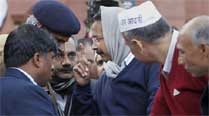 (File Photo)
(File Photo)
In his farewell speech, outgoing vice president Hamid Ansari quoted S. Radhakrishnan: “A democracy is distinguished by the protection it gives to minorities. A democracy is likely to degenerate into tyranny if it does not allow the opposition groups to criticise fairly, freely and frankly… But at the same time, minorities also have their responsibilities…” Those are wise words that must be heeded in any liberal democracy. But India’s ruling party hasn’t done so. As he steps down from his office, the BJP has caricatured and stereotyped Ansari’s message, expressed in that parting speech and in other public forums. It has tried to shoot the messenger, by casting aspersions and imputing motives.
Prime Minister Narendra Modi spoke of the outgoing VP’s work as a career diplomat in “West Asia”, his family’s association with the “Congress” and with the “Khilafat movement”, his time spent in the “Minority Commission” and “Aligarh Muslim University” — as if he were putting a label on Ansari’s thoughts. Ansari, the PM suggested, had spent many years of his life in “that circle, in that atmosphere, in that thought”, and was now free to “work, think and speak” according to his “core beliefs”. The PM’s colleagues were more vehement. New vice president M. Venkaiah Naidu rejected the view that the minorities are feeling insecure and there is growing intolerance — the burden of Ansari’s comments — as “political propaganda”. BJP general secretary Kailash Vijayvargiya alleged that Ansari’s remarks had “damaged the country’s image” and that “he may be having a political agenda”.
Instead of rushing to condemn him, the BJP should have listened to Ansari. That it chose not to accord him the respect and courtesy of engaging with his ideas and his critique, makes it appears churlish and thin-skinned. It also confirms a charge that is often levelled at the BJP. In its three years in power, even as the party has notched serial electoral successes and its government has energetically projected its agenda, it has seemed intolerant to the dissenting argument and view. This has been most sharply framed whenever an attempt is made to raise the issue of growing insecurities in the minority community in the face of a loud majoritarianism, be it in the guise of a more demanding and performative nationalism or the violence in the name of cow. As the ruling party, the BJP has so far failed to send out the firm signal that, as party and government, it will do everything it can to protect the equal rights and freedoms of the minorities, or that it is committed to safeguarding the spaces for dialogue and debate. With its angry words, the BJP indicts itself, not Ansari.
